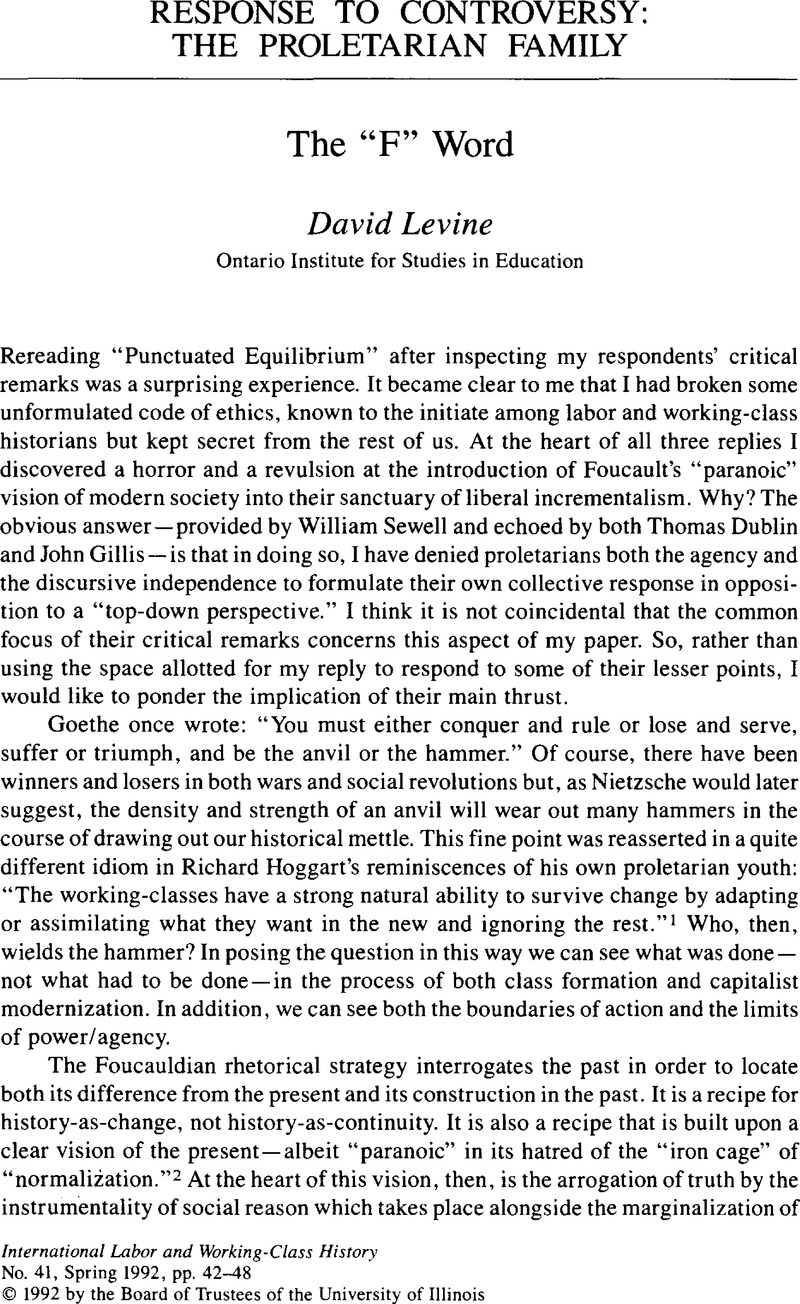No CrossRef data available.
Article contents
The “F” Word
Published online by Cambridge University Press: 16 December 2008
Abstract

- Type
- Response to Controversy: The Proletarian Family
- Information
- Copyright
- Copyright © International Labor and Working-Class History, Inc. 1992
References
Notes
1. Hoggart, Richard, The Uses of Literacy (Harmondsworth, 1957), 32Google Scholar.
2. I do not agree, however, that this vision precludes resistance; indeed, Foucault's writings and actions were scattered with continued resistance to the application of power/knowledge against those whose behavior and/or thoughts were deemed irrational.
3. Weber, Max, The Protestant Ethic and the Spirit of Capitalism (New York, 1958), 62Google Scholar. I have quoted this point more fully here than in my original contribution so that there is no mistaking the connection that Weber (and Foucault) made between the now-compartmentalized fields of “labor” and “educational” history. Because they did not concern themselves with the pigeonholing of university teaching, they were willing and able to transcend boundaries with which we now constrain ourselves.
4. Elyot, Sir Thomas, The Book of the GovernorGoogle Scholar, quoted in Hodgkin, Katherine, “Thomas Whythorne and the Problems of Mastery,” History Workshop 29 (1990): 21CrossRefGoogle Scholar. It should not be forgotten that for a Renaissance man, women were clumped with children as subjects of his authority.
5. Foucault, , The History of Sexuality, Vol. 1: An Introduction (New York, 1980), 120Google Scholar.
6. At no point in my presentation did I adopt this stance; rereading “Punctuated Equilibrium” made me wonder why Dublin suggested that it “contains no acknowledgment that the working class had two genders or that men and women may experience working-class culture or bourgeois discipline in distinctly different ways.” On the contrary, I was at pains to draw out the way in which both age- and gender-stratified roles hardened as a result of the prescriptive demands of what I called “Malthusian moralizers.”
7. It may be the case that these “helping professions” are not as successful as a “paranoic style” would suggest, but in our contemporary world, the largest role of the state is precisely in these areas. In Ontario, where I live, education is the largest item in the provincial budget and more than half of this money pays for “non-classroom” expenses. To be sure, some of this money goes toward what are ancillary “social costs” —special education and guidance counseling, testing and evaluation, public health, and so on. What is the purpose of this expenditure (and Ontario's budget is hardly exceptional in this regard) except to guarantee the production of age-graded “skills”? That these “skills” are also gendered should not escape our attention, either.
8. Foucault, , History of Sexuality, Vol. 1, 128, 130Google Scholar.
9. It goes without saying these are not two hermetically sealed categories. What happens when a student's “homeenvironment” is deemed “unsatisfactory”? A huge case-load of bureaucratic paper is developed by a team of “experts” (in the helping professions) while the threat of constant intrusion into a “problem family” remains as long as their file is “active.” One person's “paranoic style” is another's social administration.
10. It is interesting to note all three respondents were agitated by my statement, “These policies were resisted; but that resistance was unsuccessful.” Yet none of them sets this statement in context; instead, they used it as a pretext to launch into an attack on my refusal to consider “counter-discourse” or “agency.” In point of fact, I preface this sentence by describing the role of social administration in reconstructing age and gender categories and then later go on to suggest that their “success was hardly immediate, but rather than teleologically accepting their inevitable success, we might be better served by asking why it was that plebians came to redefine themselves as citizen/workers.” While the phrase “inevitable success” might be problematic to some, it was not meant to foreclose discussion so much as to direct attention back to those “age- and gender-specific categories” that are the stuff of modern social administration. Saying this is not a matter of approval; rather, it is acknowledging a matter of fact. In the eyes of our administrative governors, we are all broken down by age and sex.
11. Notwithstanding Sewell's endorsement of working-class resistance exemplified by school subcultures, it needs to be underscored that Paul Willis's “Hammertown lads” made up a tiny fraction of that student population. What about the others? With regard to them there is only silence about the “conflictual, negotiated, contradictory, and shaped” character of their culture and their discursive practice. That is not to say they were dupes of the prescriptive moralizers, but to insist a broad continuum existed between outright resistance and abject acceptance on the part of the “earholes.” Even if most Hammertown students were located somewhere between these two polarities, it is not the same as saying that the students ran the school or directed its curriculum or determined their own grades. Most schools–like other institutions– have command structures; most students are commanded, and they make their own accommodation with the powers–that–be. Romanticizing their “resistance” by elevating it into some form of discursive practice may be good academic sociology; however, it does not capture the power dynamics in the classroom. Rather, it mistakes the shadow for the substance. We need not spend more time in Plato's cave in order to discriminate between the appearance and the reality of power.


